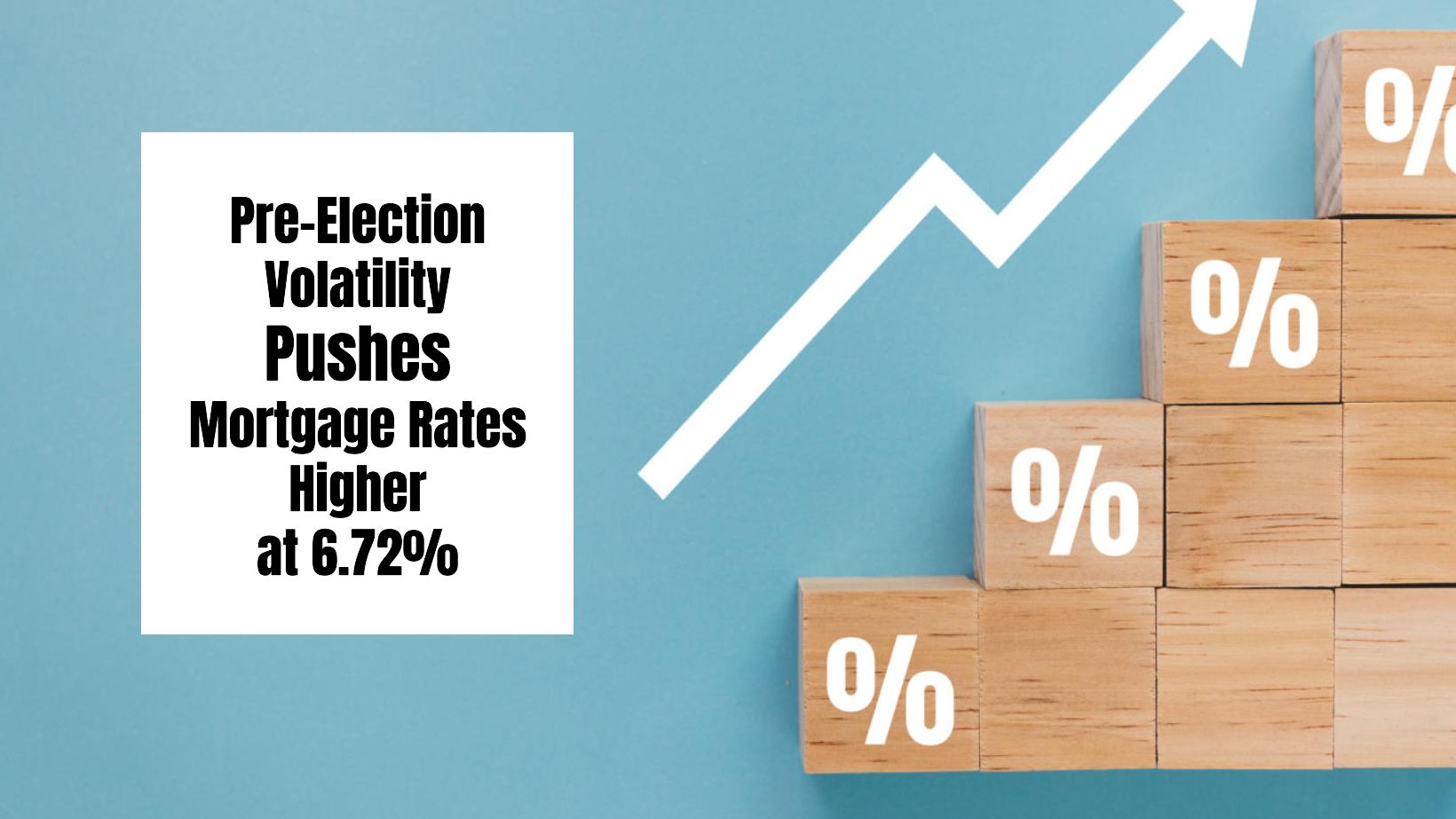Mortgage rates are the cost of borrowing money to buy a home, and recently, rates have risen for the fifth consecutive week amid fluctuations in the bond market caused by pre-election uncertainty. As of this week, the average 30-year fixed-rate mortgage is at 6.72%, up from 6.54% the previous week, while 15-year mortgage rates have increased to 5.99% from 5.71%, according to Freddie Mac.
Pre-Election Volatility Pushes Mortgage Rates Higher
Key Takeaways
- Current Rates: Average 30-year mortgage rates rose to 6.72%, while 15-year rates are at 5.99%.
- Volatile Market: Pre-election conditions have increased market volatility, impacting mortgage rates.
- Economic Indicators: The Federal Reserve's decisions, inflation data, and employment reports significantly influence future rates.
- Refinancing Demand: Higher mortgage rates have led to a 5% decline in refinancing applications.
What Are Mortgage Rates?
To put it simply, mortgage rates are the interest rates lenders charge to borrow money for buying a house. When you decide to get a mortgage, you agree to repay the loan over a specific period, typically ranging from 15 to 30 years, with interest fees. The interest charged is a significant factor in determining your monthly mortgage payment, making it essential to understand how these rates work.
Recommended Read:
Why Do Mortgage Rates Change?
Several factors contribute to fluctuations in mortgage rates:
- Federal Reserve Policies: The Federal Reserve, or Fed, plays a crucial role in setting the benchmark interest rates that influence lending rates. When the Fed raises or lowers these interest rates, mortgage rates often follow suit. For example, in response to strong economic data, the Fed is expected to potentially trim interest rates by 0.25% in its upcoming meeting, leading to speculations about mortgage rates.
- Economic Conditions: A healthy economy may lead to rising rates as lenders anticipate higher inflation and lower default rates. Conversely, a struggling economy might see rates drop as demand for homes weakens.
- Inflation: As prices rise, lenders typically increase mortgage rates to maintain their returns on investment. Recent data indicated an inflation increase of 2.1%, which is near the Fed's target of 2%.
- Bond Market Trends: Mortgage rates closely track the yields on 10-year Treasury bonds. Recently, these yields have increased, driven by strong economic data and uncertainty regarding the upcoming presidential elections.
- Housing Demand: If demand for housing remains high, lenders may raise rates to manage the influx of mortgage applications. Currently, purchase applications have shown a 5% increase week-over-week, suggesting robust activity in the housing market.
Recent Trends in Mortgage Rates
In the past few weeks, mortgage rates have experienced a steady increase. The average 30-year fixed-rate mortgage rose from 6.08%—its lowest point in two years—at the end of September to currently standing at 6.72%. This trend indicates a tightening market as traders adjust to newly released economic data and anticipate upcoming events such as the 2024 election and the Fed's interest rate decision.
According to Freddie Mac, rates had initially dropped to a two-year low late last month, but they have been creeping higher since amid concerns over inflation and jobs data that reflect a strong economy. In his statement, Sam Khater, Freddie Mac’s chief economist, noted that while rates may be cresting, they are unlikely to reach earlier highs noticed earlier this year.
The Impact of Economic Data on Mortgage Rates
Economic reports will be pivotal in determining future mortgage rate trends. Key economic indicators include:
- Inflation Data: The recent inflation report showed price increases of 2.1% over the past year. However, if inflation remains stubborn, further rate hikes by the Fed could happen, impacting mortgage rates.
- Employment Reports: Jobs data will provide insights into the economy's health before the Fed's next meeting. A strong employment report could bolster the case for the Fed to keep rates steady or to raise them.
Current Mortgage Market Context
As of now, the Mortgage Bankers Association reported a 5% decline in applications for refinancing as higher rates touch the refinancing segment of the market adversely. Conversely, there was a 5% uptick in purchase applications compared to the previous week, suggesting buyers are still interested in entering the housing market despite rising costs.
What Lies Ahead for Mortgage Rates?
Forecasting mortgage rates can be particularly challenging due to the numerous factors at play. Economists and analysts are closely monitoring inflation trends, jobs reports, and the upcoming presidential election for clues about where rates may head. Predictions indicate that while there might be a potential to see rates fall towards the end of the year, many suggest that mortgage rates will continue hovering around the 6% to 7% range for the near term. Sources like Bankrate and U.S. News project rates may stabilize within this bracket until economic conditions shift significantly.
Conclusion
The mortgage market is influenced by a myriad of factors, including economic indicators, Federal Reserve decisions, and broader market trends. With the current rise in rates amid volatility in the bond market driven by upcoming economic events, borrowers must stay informed to navigate their options effectively. While higher mortgage rates pose challenges for buyers and those looking to refinance, understanding these dynamics can empower homebuyers to make more informed decisions in their homeownership journey.
Related Articles:
- Mortgage Rates Need to Drop by 2% Before Buying Spree Begins
- Mortgage Rates Predictions for the Next Three Months Q4 2024
- Prediction: Why Mortgage Rates Won’t Go Below 6% in 2024?
- Will Mortgage Rates Ever Be 3% Again: Future Outlook
- Mortgage Rates Predictions for Next 2 Years
- Mortgage Rate Predictions for Next 5 Years
- Mortgage Rate Predictions for 2025: Expert Forecast
- Prediction: Interest Rates Falling Below 6% Will Explode the Housing Market
- Mortgage Rate Predictions: Why 2% and 3% Rates are Out of Reach
- How Lower Mortgage Rates Can Save You Thousands?
- How to Get a Low Mortgage Interest Rate?
- Will Mortgage Rates Ever Be 4% Again?


